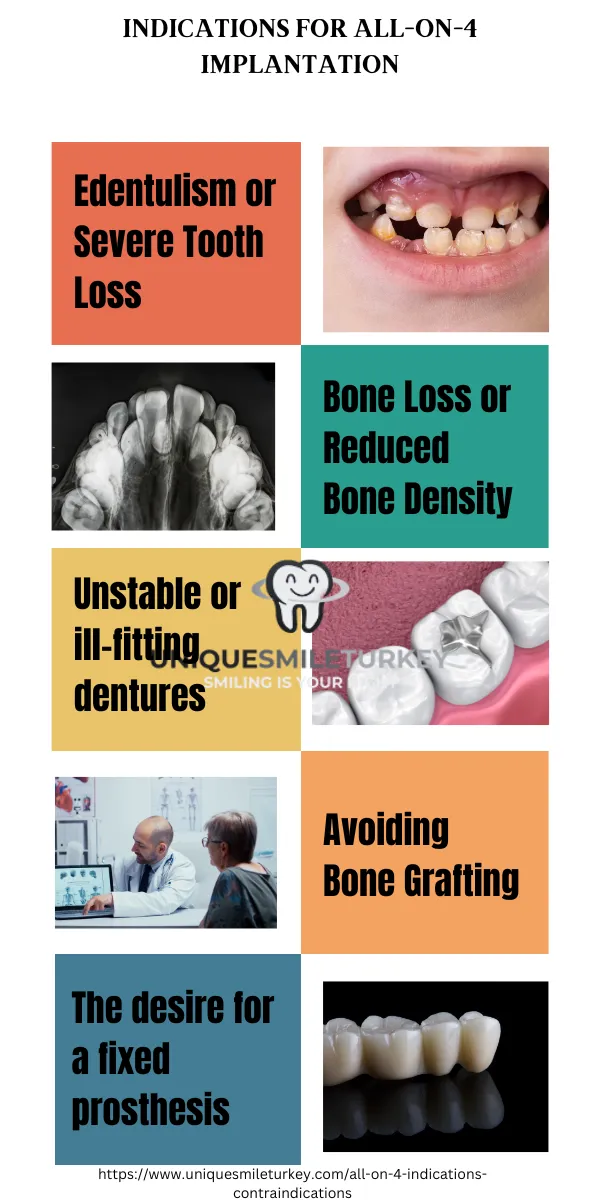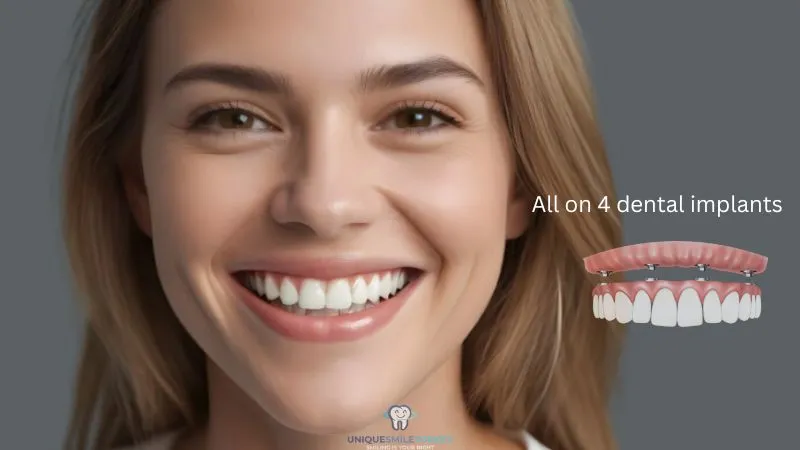


All-on-4 dental implant is a unique dental process developed to grant patients with a complete set of teeth in cases where they have lost the majority or entirety of their original teeth all in one dental arch (either the upper or lower jaw).

All-on-4 procedure is indicated in various situations, including:
All-on-4 is suitable for individuals who are completely edentulous in one dental arch or have lost most of their teeth.
Patients who currently wear removable partial dentures and experience discomfort, instability, or difficulty with chewing or speaking may benefit from the stability and improved function provided by All-on-4 implants.
All-on-4 Antalya technique is designed to maximize the available bone support by tilting two of the four implants, which can be beneficial for patients with some degree of bone loss or reduced bone density in the jaw.
All-on-4 implants can often be placed without bone grafting, an additional surgical procedure to build up the jawbone. It saves time, cuts expenses, and streamlines treatment for certain patients.
Patients who prefer a fixed and permanent solution for their missing teeth rather than removable dentures may opt for All-on-4 implants.
All-on-4 Turkey provides excellent chewing function, allowing patients to eat a wide range of foods comfortably. It also offers a natural-looking and aesthetically pleasing smile.
Dental implants, including those used in the All-on-4 technique, help stimolate the jawbone, reducing the risk of bone loss and preserving the facial structure.

All-on-4 implants rehabilitate an entire dental arch with just four implants, while all-on-6 dental implants rehabilitate an entire dental arch with six implants, making them an attractive option for patients who want to minimize the number of implants required.
When considering All-on-4 implants, one must remember that their suitability varies depending on oral health, bone density, and overall medical condition. Thus, it is crucial to have a oral surgeon evaluate these individual factors. A thorough examination and treatment plan will help determine if the All-on-4 procedure is the best option for a patient's dental needs and goals.
While All-on-4 dental implant procedure is a highly successful and widely used treatment option for many patients, there are specific contraindications that may make some individuals unsuitable candidates for this procedure. Factors or conditions that may heighten complications or impede treatment success are known as contraindications. Some contraindications for All-on-4 implantation may include:
Patients with advanced bone loss in the jaw may not have enough bone density to support dental implants securely. In such cases, bone grafting or other alternative treatments may be necessary before considering All-on-4.
Certain medical conditions, such as uncontrolled diabetes, immune disorders, or bleeding disorders, can interfere with the healing process and increase the risk of implant failure. Well-controlled systemic diseases may not be contraindications, but careful evaluation and coordination with the patient's healthcare provider are essential.
During pregnancy, it is typically best to avoid dental implant procedures as they could pose risks to the growing baby, and the oral environment tends to undergo changes.
Untreated or active gum disease can compromise the success of dental implants. It's essential to have a healthy oral environment before proceeding with All-on-4 implantation.
Smoking and tobacco use can negatively impact the healing process and significantly increase the risk of implant failure. Dentists may recommend quitting smoking before considering the procedure.
All-on-4 is generally not recommended for young patients whose jawbones are still developing, as the bone structure may not be stable enough to support dental bridge.
In some cases, the jaw may not have enough space or favourable anatomy to accommodate the All-on-4 implants.
Some medications, such as bisphosphonates used to treat certain medical conditions, may affect bone healing and integration of dental implants.
It's essential to have a thorough evaluation by our qualified dentist to determine if you are a suitable candidate for the All-on-4 procedure. They will review your medical history, conduct a comprehensive oral examination, and may take imaging scans (X-rays or CT scans) to assess your jawbone density and overall oral health.
If any medical issues or worries about the All-on-4 procedure trouble you, speak openly with your dental provider. They will steer you towards suitable treatment choices for your particular circumstances.